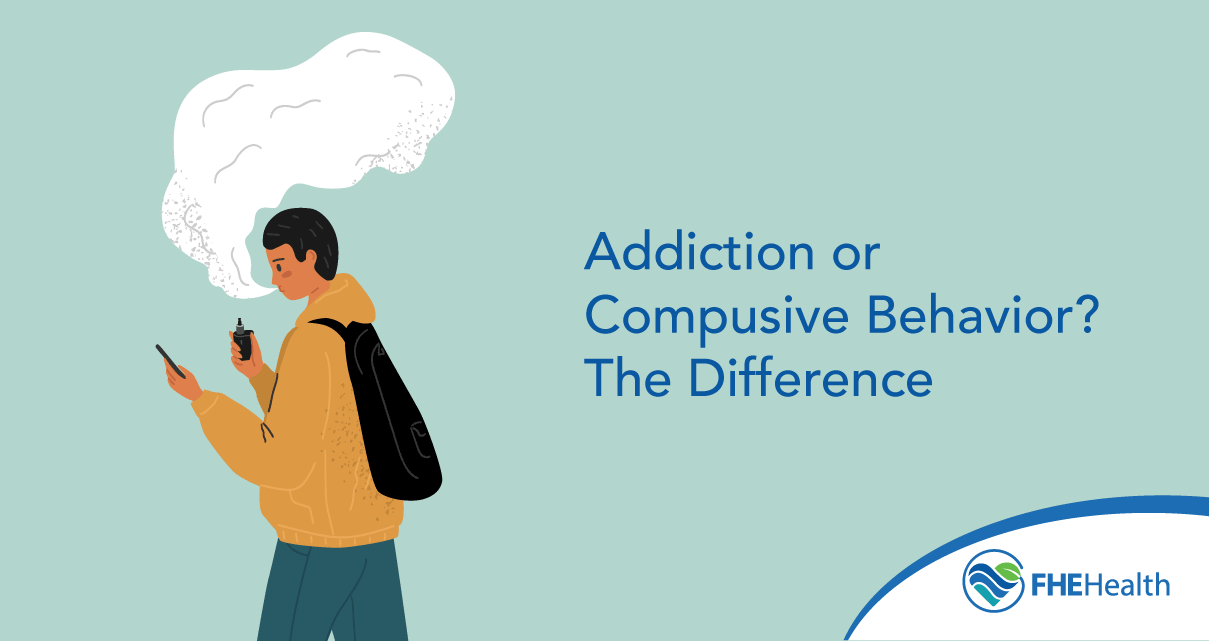
Addiction occurs when a person becomes physically or psychologically reliant on a rewarding behavior or substance. Substance use disorder, a common kind of addiction, affects 48.5 million Americans over the age of 12. The dopamine released by addictive behavior or substances gives the brain a faulty sense of satisfaction. Over time, a person’s brain develops a tolerance and requires more of the behavior or substance to achieve the same effect. This often leads to a vicious cycle of chasing smaller rewards despite increasing risks.
On the other hand, compulsive behavior involves repeating actions or thoughts even though they don’t bring any reward or satisfaction. Unlike addiction, compulsive behaviors are done in a rigid, repetitive way to ease anxiety or discomfort. People with compulsions may feel an urgent need to do something, but the action doesn’t give them any real benefit and may even cause distress. For example, someone with OCD might feel forced to wash their hands over and over — not because it feels good but because they believe something bad will happen if they don’t. The behavior is driven by an internal urge instead of seeking a reward. This differs from addiction because the behaviors aren’t fueled by a cycle of reward or growing need. Instead, they continue because of emotional or psychological pressure without any promise of a positive outcome.
Key Differences in Causes and Triggers
The causes of addiction are usually a mix of genetic, environmental, and psychological factors. Genetics can play a big role, with people who have a family history of addiction being more likely to develop similar habits. Environmental factors such as being exposed to substance use at a young age or experiencing stress can also increase the risk. Psychologically, people may turn to substances or behaviors to cope with traumatic experiences or mental health disorders.
The brain’s reward system is central to addiction because certain substances or behaviors release dopamine, which makes the behavior feel good and harder to stop. Stress, social situations, and feelings of low self-worth are common triggers that can push people into addictive behaviors.
While both addiction and OCD can be worsened by stress, the difference between addiction and compulsion is seeking a reward versus soothing discomfort. OCD is mainly driven by internal factors, such as intrusive thoughts or anxiety. People with OCD often have persistent unwanted thoughts — or even obsessions — that cause discomfort or fear.
To relieve this anxiety, they compulsively perform certain actions, even though they know these behaviors don’t make sense. OCD triggers are usually linked to specific thoughts and situations that cause stress — not to external rewards or pleasure. The “cycle” in OCD is more about reducing anxiety or avoiding imagined harm than seeking a reward. Social pressure, changes in routine, and even small events can set off OCD symptoms.
Treatment Options
When treating OCD vs. addiction, a person’s unique needs must come first. At FHE Health, we provide inpatient and outpatient treatment options designed to meet the specific needs of individuals dealing with these conditions. The right approach depends on the severity of symptoms, personal circumstances, and recovery goals.
Inpatient Treatment
Inpatient treatment at FHE Health offers a structured, supportive environment where individuals can focus entirely on their recovery. This level of care is ideal for those with severe symptoms, co-occurring mental health disorders, or a need for 24-7 supervision. Our inpatient programs provide comprehensive support through evidence-based therapies and medical care.
- Exposure and response prevention (ERP) therapy
- Cognitive behavioral therapy (CBT)
- Intensive individual and group therapy
- Close supervision for severe symptoms or co-occurring disorders
- Support for managing compulsive behaviors
- Medical detox and supervision for withdrawal symptoms
- Cognitive behavioral therapy (CBT)
- Dialectical behavior therapy (DBT)
- 12-step programs
- Individual and group therapy
- Relapse prevention and coping strategies
Outpatient Treatment
Outpatient treatment offers flexibility for individuals who require ongoing care but can manage their daily lives outside a full-time facility. This option is well-suited for those transitioning from inpatient care or those with milder symptoms who benefit from continued therapy and support.
- Flexible therapy sessions (individual and group)
- Medication management (if needed)
- Continued support to reduce compulsions
- Strategies to manage anxiety and improve daily life
- Ongoing therapy and counseling
- Flexible scheduling to fit into daily life
- Support groups
- Continued relapse prevention and coping skills training
Break Free From Unwanted Thoughts and Behavior
Though different in their causes and triggers, both addiction and OCD can feel overwhelming. However, breaking free from the grip of these conditions is possible with the right treatment and support. If you or a loved one is struggling with addiction or mental health disorders, speaking with a mental health professional who understands these challenges is the first step toward a healthier, more fulfilling life.
At FHE Health, we know how difficult it can be to navigate life with an addiction or compulsion, but we also know it’s possible to make lasting changes. Whether through therapy, medication, or a combination of approaches, there’s hope for a brighter future. If you’re concerned about addiction or OCD, don’t hesitate to reach out to FHE Health. Our team is here to help you take that first step toward breaking free and starting your journey to recovery.






